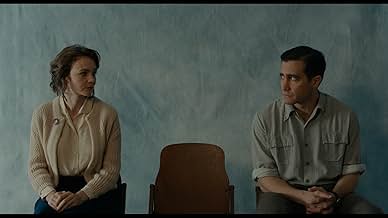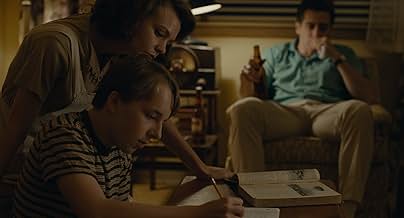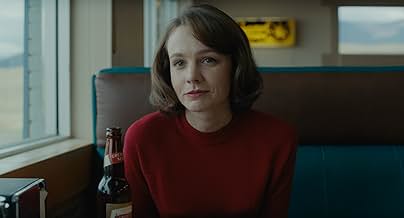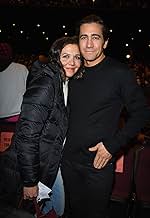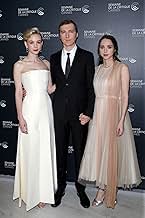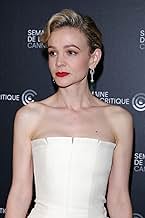PUNTUACIÓN EN IMDb
6,8/10
32 mil
TU PUNTUACIÓN
Un adolescente tiene que lidiar con la complicada reacción de su madre cuando su padre les abandona temporalmente para realizar un peligroso trabajo.Un adolescente tiene que lidiar con la complicada reacción de su madre cuando su padre les abandona temporalmente para realizar un peligroso trabajo.Un adolescente tiene que lidiar con la complicada reacción de su madre cuando su padre les abandona temporalmente para realizar un peligroso trabajo.
- Dirección
- Guión
- Reparto principal
- Premios
- 6 premios y 24 nominaciones en total
Travis W Bruyer
- Forester
- (as Travis Bruyer)
Zoe Colletti
- Ruth-Ann
- (as Zoe Margaret Colletti)
Richard L. Olsen
- Older Policeman
- (as Richard Olson)
Lex Anastasia
- Lady
- (sin acreditar)
Avery Bagenstos
- Football Player
- (sin acreditar)
Chris Bodelle
- Shopper
- (sin acreditar)
Reseñas destacadas
Throughout the movie you deeply get the uncomfortability of the kid that feel harmless, powerless in front of the chaos with which the events happens and the unpredictability of his parents' behavior.
At the same time this over-the-top behavior feels also unnatural and the characters less real, less authentic and therefore it's difficult to sympathize or at least emphasize with them.
So at the end the movie kinda works, technically it's beautiful, but it's clear that it could have been better, more evolving and that's a bit underwhelming.
It's still a promising debut for Paul Dano.
This movie is being described as "A boy witnesses his parents' marriage falling apart after his mother finds another man." And while I think thats true, I think its a bit more complex than that. It also is a bit of a coming of age story where Joe has to grow up and be the adult in this family, but also it seems that mom is having a mid-life crisis (although shes not quite mid-life) and trying to discover who she is outside of being the "perfect 50s housewife" that perhaps she feels trapped in. There's a lot of symbolism in this movie. The backdrop of this movie is that there is a wildfire that has been raging and the townspeople have been desperately trying to put out. And that correlates with Joe and his own family. Hes trying to put out the fire in his own family. Also, Joe works at photography studio and Paul Dano (the director and co-writer) even said that this is supposed to be a PORTRAIT of a family life.
Speaking of Paul Dano, I think he did well with his directorial debut. I think visually there are some gorgeous shots in this movie. Like for instance where Joe is watching the wildfires (and hes perfectly centered - probably again to mimic the portrait vibe). Also where Joe is about to give up but it starts to snow and hope has regained. I liked the film for the most part. They do frame the film by following Joe's perspective. And I think its mostly effective in making you feel for this kid, my only problem is there are a couple of parts where I feel like there are gaps in the story. Without giving too much away there is a scene where Jerry (Jake Gyllenhaal) has decided to seek revenge and it ends up backfiring. And yet, the next time we see him everything seems to be fine. And it never really gets explained what happened. Theres a brief line that they decided it was a "misunderstanding" but you never really see what happened and he also gets hurt during this, and that never gets brought up again either. I know Paul and Zoe (the other writer) were adapting this from a book and perhaps thats the way it is in there too. But I personally found that a little frustrating. I needed a little more.
Carey Mulligan is fantastic in this. She would be deserving to have her name thrown in the hat for awards season. I also thought Ed Oxenbould was a standout too. Which is good to hear since he's onscreen for pretty much most of the movie. I definitely will be looking forward to more of his things. I also thought Jake Gyllenhaal was good but hes absent for a good chunk of the film and so he just didnt stand out as much as Carey or Ed did.
Overall I liked the film. It wasn't perfect, but I would totally check out another film that Paul Dano directs.
Speaking of Paul Dano, I think he did well with his directorial debut. I think visually there are some gorgeous shots in this movie. Like for instance where Joe is watching the wildfires (and hes perfectly centered - probably again to mimic the portrait vibe). Also where Joe is about to give up but it starts to snow and hope has regained. I liked the film for the most part. They do frame the film by following Joe's perspective. And I think its mostly effective in making you feel for this kid, my only problem is there are a couple of parts where I feel like there are gaps in the story. Without giving too much away there is a scene where Jerry (Jake Gyllenhaal) has decided to seek revenge and it ends up backfiring. And yet, the next time we see him everything seems to be fine. And it never really gets explained what happened. Theres a brief line that they decided it was a "misunderstanding" but you never really see what happened and he also gets hurt during this, and that never gets brought up again either. I know Paul and Zoe (the other writer) were adapting this from a book and perhaps thats the way it is in there too. But I personally found that a little frustrating. I needed a little more.
Carey Mulligan is fantastic in this. She would be deserving to have her name thrown in the hat for awards season. I also thought Ed Oxenbould was a standout too. Which is good to hear since he's onscreen for pretty much most of the movie. I definitely will be looking forward to more of his things. I also thought Jake Gyllenhaal was good but hes absent for a good chunk of the film and so he just didnt stand out as much as Carey or Ed did.
Overall I liked the film. It wasn't perfect, but I would totally check out another film that Paul Dano directs.
The directorial debut of actor Paul Dano, Wildlife is based on the 1990 novel by Richard Ford, and is written for the screen by Dano and his girlfriend Zoe Kazan. Looking at the implosion of a family from the perspective of a 14-year-old member of said family, the film is thematically similar to Revolutionary Road (2008) and Blue Valentine (2010), and aesthetically similar to the Texas scenes in El árbol de la vida (2011) (the period detail drips off the screen, whilst the use of a child as the focaliser colours much of what's depicted). And although Wildlife is a piece of remarkably nostalgic filmmaking, at the same time, it tells somewhat of a progressive story, demonstrating the uncertainty with which second-wave feminism manifested itself at a grassroots level prior to really taking off in 1963. Although it's essentially a character study, the film also suggests the 1950s-style clean-cut, neatly trimmed, rigidly defined way of life, built around the perfect nuclear family wherein a wife must be subservient to her husband, is about to become a thing of the past.
Set in Great Falls, Montana in 1960, the film tells the story of the peripatetic Brinson family; father Jerry (Jake Gyllenhaal), mother Jeannette (Carey Mulligan), and 14-year-old son Joe (Ed Oxenbould). When Jerry loses his job and takes off in a misguided attempt to reaffirm his masculinity by fighting a forest fire, something is awoken in Jeanette, who, for the first time, allows herself to admit she has become deeply unhappy, and overnight, her behaviour changes dramatically, as she rebels against her domesticity. Determined to forge a new identity, she is adamant she won't become one of the "standing dead" (the term used for trees that survive a forest fire).
Importantly, the film is set three years prior to Betty Friedan's ground-breaking The Feminine Mystique (1963), which redefined the parameters of all gender-based topics, depicting a society in which women were no longer content to do their husband's bidding and raise children. Initially, Jeanette is depicted as a quintessential 1950s wife and mother, almost to the point of cliché; she cooks, cleans, washes the clothes, does the dishes, sees that Joe attend to his homework, and when Jerry loses his job, it is Jeanette who goes out looking for work for both of them. She knows that her (unspoken and unacknowledged) role in this patriarchal society is to hold the family together, but it's a role that is nothing like she thought it would be when she was younger. Although she and Jerry seem to love one another, or they certainly used to, she clearly feels trapped by her domestic situation.
That her transformation happens so quickly is the key point; when she goes to bed, she's a wife and mother, trapped in her domestic environment, but when she wakes the next morning, she realises that she has an opportunity to escape, perhaps the best opportunity she will ever get. This has been building up for years, but she has gotten so used to feeling lost that when she gets a chance to change things, she doesn't even recognise it as such, at least not at first. Once she does, however, Jeanette makes a conscious decision to stop performing the role delegated by men. As much of the female population of the western hemisphere would be asking over the next ten or so years, Jeanette wants to know, "is this all there is?" She wants more than simply getting through the day. In this sense, she recalls Nora Helmer from Henrik Ibsen's A Doll's House (1879), or any number of Tennessee Williams heroines - a woman who wakes up to find she has become deeply unhappy despite attaining everything she once wanted, and who sets out to do whatever it takes to alter her course.
That all is not well in the Brinson household is hinted at in the opening scene, where Jerry and Jeanette have a couple of inconsequential but noticeable disagreements over dinner (such as whether Joe should continue pursuing football). This scene establishes an assuredness and subtlety-of-hand that lasts for the entire film, with Dano's directorial work proving unexpectedly sophisticated. For example, something he does several times is have characters walk off-screen to speak, whilst keeping the camera trained on Joe as he tries to listen, with the dialogue barely perceptible from just off the edge of the frame. As well as being an excellent use of off-screen space, something you don't see too often, this technique ties us rigidly to Joe's POV early on, inculcating us into his worldview. Another very nice piece of direction is an early montage cutting between Jeanette riding her bike, Jerry driving the car, and Joe riding the bus, in which each character is facing a different direction, each in isolation from the other two. It's basic cinematic shorthand, showing instead of telling, but it's very well done. Equally impressive is the penultimate scene, where Dano uses the windows of the Brinson house to block the characters in such a way as to suggest both their inner emotions, and the prevailing theme at this point of the film. For the most part, however, Dano's direction is invisible, relying far more on static painterly compositions than camera movement.
The acting, as you would expect, is universally superb. On paper, Jeanette and Warren Miller (a superb Bill Camp), an older man who becomes romantically interested in her, are very much the villains of the piece, but Mulligan and Camp's performances are so full of warmth and genuine emotion that you simply can't look at them as antagonists, and the film itself never judges them. Mulligan plays Jeanette as utterly weary, much older than her years, at times fragile, at times rock solid, both vulnerable and manipulative. Full of anger, she simply can't hold in her emotions any more. Unfortunately, in letting them out, she betrays Joe by forgetting he is only 14-years-old. When she starts drunkenly dancing with him at Miller's house, the scene is deeply uncomfortable, but Mulligan's performance is such that we don't condemn her, at least, not completely. She never allows the audience to lose sight of the fact that although she is behaving rather poorly, she is a prisoner, and is reacting against her restraints as best she can.
Of course, there are a few problems. Essentially a tale of marital angst, the narrative is not especially original - we've seen this story before, many times in fact, and for all the craft on display, Dano never really manages to say anything wholly new. Additionally, his measured direction is also too good in places - everything is so ordered, neat, and trim, that at times, the milieu doesn't seem lived-in, but more an abstract concept of what the period was like. Additionally, there are a few lines that sound great on paper, but which are just not the kind of things one says in real life. For example, Jeanette tells Joe, "I feel like I need to wake up, but I don't know what from, or what to". Later she says, "I wish I was dead. If you have a better plan for me, tell me. Maybe it'll be better than this". This kind of dialogue seems more interested in hitting thematic waypoints than developing character beats. Similarly, late in the film, Jerry says to Joe, "It's a wild life. Isn't it, son?" Proclaiming the film's title in this context doesn't even remotely work, and the line feels totally out of place, to the point of ripping you out of the narrative.
On the one hand, Wildlife is about how society was changing in 1960, and on the other, about how that change manifests itself within the Brinson family. Yes, it's another "death of the American dream" story in a long line of such films, but here, the focus is, for the most part, on character rather than theme, with Jeanette functioning in kind of a synecdochical manner; our specific entry point, she is the individual that facilitates an examination of the masses. And yes, Dano may take his eye off the ball a couple of times, with the odd bit of clunky dialogue, and a somewhat too picture-postcard perfection, but all in all, this is an excellent directorial debut.
Set in Great Falls, Montana in 1960, the film tells the story of the peripatetic Brinson family; father Jerry (Jake Gyllenhaal), mother Jeannette (Carey Mulligan), and 14-year-old son Joe (Ed Oxenbould). When Jerry loses his job and takes off in a misguided attempt to reaffirm his masculinity by fighting a forest fire, something is awoken in Jeanette, who, for the first time, allows herself to admit she has become deeply unhappy, and overnight, her behaviour changes dramatically, as she rebels against her domesticity. Determined to forge a new identity, she is adamant she won't become one of the "standing dead" (the term used for trees that survive a forest fire).
Importantly, the film is set three years prior to Betty Friedan's ground-breaking The Feminine Mystique (1963), which redefined the parameters of all gender-based topics, depicting a society in which women were no longer content to do their husband's bidding and raise children. Initially, Jeanette is depicted as a quintessential 1950s wife and mother, almost to the point of cliché; she cooks, cleans, washes the clothes, does the dishes, sees that Joe attend to his homework, and when Jerry loses his job, it is Jeanette who goes out looking for work for both of them. She knows that her (unspoken and unacknowledged) role in this patriarchal society is to hold the family together, but it's a role that is nothing like she thought it would be when she was younger. Although she and Jerry seem to love one another, or they certainly used to, she clearly feels trapped by her domestic situation.
That her transformation happens so quickly is the key point; when she goes to bed, she's a wife and mother, trapped in her domestic environment, but when she wakes the next morning, she realises that she has an opportunity to escape, perhaps the best opportunity she will ever get. This has been building up for years, but she has gotten so used to feeling lost that when she gets a chance to change things, she doesn't even recognise it as such, at least not at first. Once she does, however, Jeanette makes a conscious decision to stop performing the role delegated by men. As much of the female population of the western hemisphere would be asking over the next ten or so years, Jeanette wants to know, "is this all there is?" She wants more than simply getting through the day. In this sense, she recalls Nora Helmer from Henrik Ibsen's A Doll's House (1879), or any number of Tennessee Williams heroines - a woman who wakes up to find she has become deeply unhappy despite attaining everything she once wanted, and who sets out to do whatever it takes to alter her course.
That all is not well in the Brinson household is hinted at in the opening scene, where Jerry and Jeanette have a couple of inconsequential but noticeable disagreements over dinner (such as whether Joe should continue pursuing football). This scene establishes an assuredness and subtlety-of-hand that lasts for the entire film, with Dano's directorial work proving unexpectedly sophisticated. For example, something he does several times is have characters walk off-screen to speak, whilst keeping the camera trained on Joe as he tries to listen, with the dialogue barely perceptible from just off the edge of the frame. As well as being an excellent use of off-screen space, something you don't see too often, this technique ties us rigidly to Joe's POV early on, inculcating us into his worldview. Another very nice piece of direction is an early montage cutting between Jeanette riding her bike, Jerry driving the car, and Joe riding the bus, in which each character is facing a different direction, each in isolation from the other two. It's basic cinematic shorthand, showing instead of telling, but it's very well done. Equally impressive is the penultimate scene, where Dano uses the windows of the Brinson house to block the characters in such a way as to suggest both their inner emotions, and the prevailing theme at this point of the film. For the most part, however, Dano's direction is invisible, relying far more on static painterly compositions than camera movement.
The acting, as you would expect, is universally superb. On paper, Jeanette and Warren Miller (a superb Bill Camp), an older man who becomes romantically interested in her, are very much the villains of the piece, but Mulligan and Camp's performances are so full of warmth and genuine emotion that you simply can't look at them as antagonists, and the film itself never judges them. Mulligan plays Jeanette as utterly weary, much older than her years, at times fragile, at times rock solid, both vulnerable and manipulative. Full of anger, she simply can't hold in her emotions any more. Unfortunately, in letting them out, she betrays Joe by forgetting he is only 14-years-old. When she starts drunkenly dancing with him at Miller's house, the scene is deeply uncomfortable, but Mulligan's performance is such that we don't condemn her, at least, not completely. She never allows the audience to lose sight of the fact that although she is behaving rather poorly, she is a prisoner, and is reacting against her restraints as best she can.
Of course, there are a few problems. Essentially a tale of marital angst, the narrative is not especially original - we've seen this story before, many times in fact, and for all the craft on display, Dano never really manages to say anything wholly new. Additionally, his measured direction is also too good in places - everything is so ordered, neat, and trim, that at times, the milieu doesn't seem lived-in, but more an abstract concept of what the period was like. Additionally, there are a few lines that sound great on paper, but which are just not the kind of things one says in real life. For example, Jeanette tells Joe, "I feel like I need to wake up, but I don't know what from, or what to". Later she says, "I wish I was dead. If you have a better plan for me, tell me. Maybe it'll be better than this". This kind of dialogue seems more interested in hitting thematic waypoints than developing character beats. Similarly, late in the film, Jerry says to Joe, "It's a wild life. Isn't it, son?" Proclaiming the film's title in this context doesn't even remotely work, and the line feels totally out of place, to the point of ripping you out of the narrative.
On the one hand, Wildlife is about how society was changing in 1960, and on the other, about how that change manifests itself within the Brinson family. Yes, it's another "death of the American dream" story in a long line of such films, but here, the focus is, for the most part, on character rather than theme, with Jeanette functioning in kind of a synecdochical manner; our specific entry point, she is the individual that facilitates an examination of the masses. And yes, Dano may take his eye off the ball a couple of times, with the odd bit of clunky dialogue, and a somewhat too picture-postcard perfection, but all in all, this is an excellent directorial debut.
This happened to be one of my most hyped films of the year. I am a big fan of Carey Mulligan and Zoe Kazan so I knew I had to check this out as soon as earthly possible. Had the pleasure of attending a screening of this film at the IFC Center with directer Paul Dano and co-wwriter Zoe Kazan present for a Q & A. The film is beautiful to look at with rich cinematography, has a number of strong performances with a fantastic one from Carey Mulligan, and shows that Dano and Kazan have the talent to get behind the camera and bring a quality piece of work.
The film shows a family in 1960's Montana and how life changing events cause their family to fall apart. After the father is fired, he decides to take a job putting out wildfires which causes him to leave the home for an extended period of time. During this time his wife struggles trying to hold her family together by doing whats best for them but she also questions if she even loves her husband. All this while, their teenage son has to watch his parents drift apart silently. The film stars Carey Mulligan, Jake Gyllenhaal, Ed Oxenbould, and Bill Camp.
As mentioned earlier the cinematography and especially the scenery in this film are gorgeous. Lush, rich and a perfect description for a simpler quieter time in 60's Montana. The film gets quite uncomfortable as you start wondering about the state of mind Jeanette Brinson (Mulligan) and what she gets herself into. You are basically like the teenage son Joe (Oxenbould). You see things from his lenses, feel exactly what he is feeling, and can't look away much like him. Its a startling tale but one that depicts a perfect looking family where it is anything but.
Carey Mulligan is one of the best actresses out there today, that's not even a debate. She's had so many great performances that I don't even know which is her best. This is definitely up there though. It's such an introspective look into the lives of a family where things are just beyond repair. I'm very impressed by Dano and Kazan. Both are talented on the camera but wow they were able to engineer something so wonderful behind the camera. I'm definitely intrigued to see if the duo decide to continue with film-making an writing.
8/10
The film shows a family in 1960's Montana and how life changing events cause their family to fall apart. After the father is fired, he decides to take a job putting out wildfires which causes him to leave the home for an extended period of time. During this time his wife struggles trying to hold her family together by doing whats best for them but she also questions if she even loves her husband. All this while, their teenage son has to watch his parents drift apart silently. The film stars Carey Mulligan, Jake Gyllenhaal, Ed Oxenbould, and Bill Camp.
As mentioned earlier the cinematography and especially the scenery in this film are gorgeous. Lush, rich and a perfect description for a simpler quieter time in 60's Montana. The film gets quite uncomfortable as you start wondering about the state of mind Jeanette Brinson (Mulligan) and what she gets herself into. You are basically like the teenage son Joe (Oxenbould). You see things from his lenses, feel exactly what he is feeling, and can't look away much like him. Its a startling tale but one that depicts a perfect looking family where it is anything but.
Carey Mulligan is one of the best actresses out there today, that's not even a debate. She's had so many great performances that I don't even know which is her best. This is definitely up there though. It's such an introspective look into the lives of a family where things are just beyond repair. I'm very impressed by Dano and Kazan. Both are talented on the camera but wow they were able to engineer something so wonderful behind the camera. I'm definitely intrigued to see if the duo decide to continue with film-making an writing.
8/10
It's a decent film, nothing memorable or amazing, but it does have a personality.
Set in the 60s, we follow this family of 3 as the parents' relationship and lives fall appart and the son stands in the middle like a deer caught in the headlights. It's a four-person, five-act story that could easily be a stage play.
Carrey Mulligan plays the mother as a mixture of Blanche DuBois / Madame Bovary, someone who imagined a better life than what she got and reaches a breaking point.
Jake Gyllenhaal plays the dad who is similarly disappointed by his lack of progress in life and has his hopes pinned on his son becoming something better than he could ever become, embarking on a desperate attempt to salvage his dignity.
Then there's the son (Ed Oxenbould), who most of the time is just at a loss. He is presented as the only mature/responsible person in the family, who is confused and frustrated by his parents' behaviours but simultaneously too reserved/repressed to do anything about it.
Bill Camp plays the catalyst in the family's implosion - not so much a separate character, as an embodiment of the family's desperation.
It's not unpleasant to watch and it has a nice stage-play feel to it, what with the addition of the poetic backdrop of the neverending forest fires that burn throughout the summer and until the arrival of the first snow. However, it also doesn't manage to be captivating and all the characters feel underdeveloped. The mum and dad are practically the same person: the frustrated adult who - at one point - tried too hard to achieve a better life and got punished for it. The son's character is equally underwhelming: he was probably meant to be this stoic, introverted, keeping his feelings to himself and hurting in silence, but he just comes across as bland and boring.
American Beauty and Revolutionary Road did it better.
Set in the 60s, we follow this family of 3 as the parents' relationship and lives fall appart and the son stands in the middle like a deer caught in the headlights. It's a four-person, five-act story that could easily be a stage play.
Carrey Mulligan plays the mother as a mixture of Blanche DuBois / Madame Bovary, someone who imagined a better life than what she got and reaches a breaking point.
Jake Gyllenhaal plays the dad who is similarly disappointed by his lack of progress in life and has his hopes pinned on his son becoming something better than he could ever become, embarking on a desperate attempt to salvage his dignity.
Then there's the son (Ed Oxenbould), who most of the time is just at a loss. He is presented as the only mature/responsible person in the family, who is confused and frustrated by his parents' behaviours but simultaneously too reserved/repressed to do anything about it.
Bill Camp plays the catalyst in the family's implosion - not so much a separate character, as an embodiment of the family's desperation.
It's not unpleasant to watch and it has a nice stage-play feel to it, what with the addition of the poetic backdrop of the neverending forest fires that burn throughout the summer and until the arrival of the first snow. However, it also doesn't manage to be captivating and all the characters feel underdeveloped. The mum and dad are practically the same person: the frustrated adult who - at one point - tried too hard to achieve a better life and got punished for it. The son's character is equally underwhelming: he was probably meant to be this stoic, introverted, keeping his feelings to himself and hurting in silence, but he just comes across as bland and boring.
American Beauty and Revolutionary Road did it better.
¿Sabías que...?
- CuriosidadesWhen Paul Dano requested the rights to adapt Richard Ford's novel into this movie he received the following response: "I am grateful to you for your interest in my book, but I should also say this in hopes of actually encouraging you. My book is my book, your picture, were you to make it, is your picture. Your movie maker's fidelity to my novel is of no great concern to me. Establish your own values, means, goal. Leave the book behind so it doesn't get in the way."
- PifiasAt 1:05:47, when Jeanette is standing near Joe, her lipstick is faded. At 1:05:57, when she turns around to put her arms in the coat, It's dark again.
- ConexionesFeatured in CTV News at Six Toronto: Episodio fechado 10 septiembre 2018 (2018)
- Banda sonoraSincerely
Written by Harvey Fuqua & Alan Freed
Performed by The Moonglows
Courtesy of Geffen Records
Under license from Universal Music Enterprises
Selecciones populares
Inicia sesión para calificar y añadir a tu lista para recibir recomendaciones personalizadas
- How long is Wildlife?Con tecnología de Alexa
Detalles
Taquilla
- Recaudación en Estados Unidos y Canadá
- 1.050.616 US$
- Fin de semana de estreno en EE. UU. y Canadá
- 104.589 US$
- 21 oct 2018
- Recaudación en todo el mundo
- 3.321.367 US$
- Duración1 hora 45 minutos
- Color
- Relación de aspecto
- 1.85 : 1
Contribuir a esta página
Sugerir un cambio o añadir el contenido que falta

Principal laguna de datos
What is the streaming release date of Lo que arde con el fuego (2018) in Australia?
Responde






